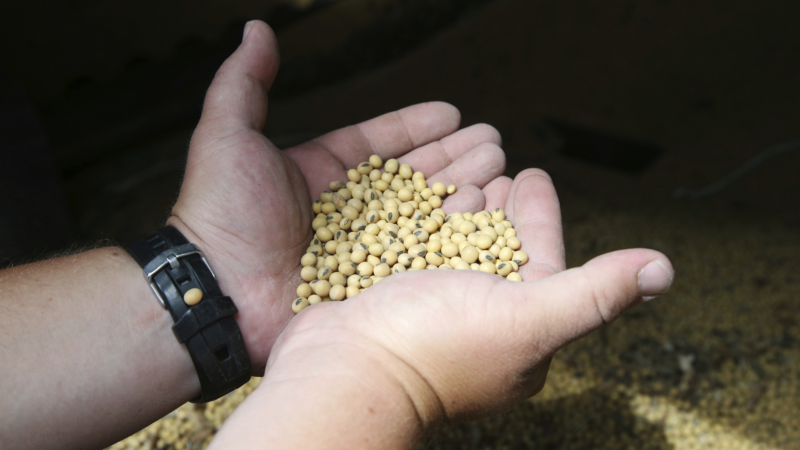Tariffs threaten to upend markets American farmers depend on
U.S. row crop farmers produce enormous quantities of food, and they depend on selling lots of it overseas. They thrive under free trade policies.
They’re also big spenders, laying out billions on the heavy equipment, seed and fertilizer they use.
Which makes them doubly vulnerable to tariffs.
“These tariffs are just absolutely bad news,” said Vance Ehmke from the western Kansas farm his ancestors homesteaded in 1885. “They cause the prices for everything that we buy to go up, and the price for everything that we sell to go down. I mean, it is being economically drawn and quartered.”
Lots of farmers say they were stretched to the breaking point before the tariffs took hold. The price of tractors has jumped 50% in five years, according to Successful Farming magazine; fertilizer has more than doubled, but commodity prices are low. Ehmke said the price of wheat started to climb earlier this year but plummeted when Trump began talking about broad tariffs.
“I mean, that was a $30,000, $35,000, $40,000 hit that we’ve taken, and I’m laying a huge amount of that right at Trump’s feet,” said Ehmke.
Large-scale American farmers depend on exports to make a living. About half of Ehmke’s wheat is sold overseas. But Ehmke and the markets assume that countries recently hit with export tariffs will retaliate by taxing U.S. food exports, which will cut demand and drive prices even lower.
The big, conservative farm trade groups fear the same thing.
“More than 20% of farm income comes from exports,” said American Farm Bureau Federation President Zippy Duvall in a statement responding to the latest round of tariffs. “Tariffs will drive up the cost of critical supplies, and retaliatory tariffs will make American-grown products more expensive globally. The combination not only threatens farmers’ competitiveness in the short-term, but it may cause long-term damage by leading to losses in market share,” said Duvall.
Loss of market share is a big deal. It takes decades to build trading relationships. The U.S. has long enjoyed a good reputation as a reliable food supplier. Farmers don’t want to throw that away. But Kenneth Hartman, Jr., president of the National Corn Growers Association, worries that his best export partner, Mexico, will soon be looking elsewhere for corn.
“If we get tariffs for too long, these other countries are going to start talking to Brazil and Argentina, and they can take a lot of our markets away,” said Hartman. “And when you lose a market, it’s hard to get them back.”
Hartman, is a farmer himself with 4,000 acres of corn and soybeans south of St. Louis. He’s concerned but holding out hope that Trump will use tariffs to pry open more overseas markets to U.S. food.
“Trump’s a negotiator,” said Hartman. “We’re hoping that he can come up with some negotiations that work on building markets. We think there’s some opportunities in the Asian area, when it comes to Vietnam, when it comes to the Philippines,”
Trump’s new tariffs, though, fix a 46% tax on all goods coming from Vietnam and a 17% levy on products from the Philippines, which could make it harder for U.S. farmers to break into those markets.
During his first term, when a trade war he started with China cut deeply into U.S. agricultural exports, Trump’s Department of Agriculture compensated farmers with $28 billion in aid. Many farmers believe Trump will take care of them again this time.
Not Vance Ehmke. He said he “wouldn’t bet 5 cents” on a bailout, given all the budget cuts in Washington.
“The only way I put a happy face on this is to think of all the income tax we’re going to be saving,” said Ehmke with a chuckle. “That’s it.”
New York Giants hire John Harbaugh as coach after identifying him as their top choice
Harbaugh joins the Giants 11 days after he was fired by the Baltimore Ravens. The Super Bowl champion is now tasked with turning around a beleaguered franchise.
US launches new retaliatory strike in Syria, killing leader tied to deadly Islamic State ambush
A third round of retaliatory strikes by the U.S. in Syria has resulted in the death of an Al-Qaeda-affiliated leader, said U.S. Central Command.
NASA rolls out Artemis II craft ahead of crewed lunar orbit
Mission Artemis plans to send Americans to the moon for the first time since the Nixon administration.
Trump says 8 EU countries to be charged 10% tariff for opposing US control of Greenland
In a post on social media, Trump said a 10% tariff will take effect on Feb. 1, and will climb to 25% on June 1 if a deal is not in place for the United States to purchase Greenland.
‘Not for sale’: massive protest in Copenhagen against Trump’s desire to acquire Greenland
Thousands of people rallied in Copenhagen to push back on President Trump's rhetoric that the U.S. should acquire Greenland.
Uganda’s longtime leader declared winner in disputed vote
Museveni claims victory in Uganda's contested election as opposition leader Bobi Wine goes into hiding amid chaos, violence and accusations of fraud.






